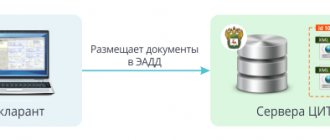Updated July 6, 2020
The customs declarant is engaged in the creation and execution of documents necessary for the import or export of goods, and interaction with representatives of customs points. The specialist works with individuals and legal entities, being an indispensable employee. By the way, in 2021, the ProfGid career guidance center developed an accurate career guidance test. He himself will tell you which professions are suitable for you, and give an opinion about your personality type and intelligence.
- Universities
Short description
A customs declarant is a person who acts as a link between the parties to the transaction and customs control. The profession is quite popular, because all companies working in the field of foreign trade need such specialists. If the company has a customs declarant on staff, then export and other customs procedures are carried out much faster, safer and cheaper.
To work in this area, excellent legal, economic and linguistic training is required, because the customs declarant must know at least 1 foreign language, which is necessary for preparing documents and communicating with representatives of foreign companies. The profession appeared several decades ago, its popularity is due to a significant increase in the volume of goods. Please note that the specialist must be a citizen of the country in which he operates.
The work is very responsible, because any mistakes will lead to a slowdown in the registration process, penalties, and cargo delay. A young specialist and a person who has decided to change his field of activity by taking specialized courses will have to study the Customs Code of the Russian Federation from cover to cover, the basics of foreign trade activities and gain other knowledge that prevents force majeure.
History of the profession
The declarant's specialty appeared not so long ago - just a few years ago. The current economic situation dictates its own conditions to companies - they have to cut costs in all areas of activity, including in the area of working with customs control points. It has become much easier and cheaper for companies to hire a declarant who is responsible for sending, transporting and customs clearance of goods, than to turn to customs brokers - intermediary organizations that perform the same functions.
Features of the profession
Experienced customs declarants can easily find work in their specialty, because the service market needs such experts. This employee not only works with documents, but also interacts with representatives of other companies and advises management. It is he who is looking for ways that will help reduce the cost, optimize or speed up customs procedures. The responsibilities of a specialist include a huge amount of work:
- registration of customs declarations and documents, checking for compliance, selection of HS codes;
- participation in customs inspections, transaction assessment, if necessary;
- entering information into electronic registers, maintaining an archive and storing documents;
- preparation and provision to the responsible authorities of a package of documents and permits necessary to perform various procedures;
- conducting business correspondence, sending requests for missing documents;
- training of young employees;
- control of cargo movement and deadlines;
- monitoring of all changes in legislation;
- calculation of customs duties, payment of customs duties, delivery of amounts of money, ensuring their correct reception and storage, reporting.
Employment, salary and career
Before choosing a profession as a customs declarant, you need to find out where to study, the pros and cons, salary, and career prospects. This information will enable future specialists to learn in advance about all the positive and negative aspects of the profession.
Places of employment:
The salary of a customs declarant directly depends on his qualifications and work experience . In most cases, it ranges from 30 to 50 thousand rubles. However, some companies are willing to pay a highly qualified employee up to 100 thousand rubles.
The career of a young specialist begins with observing the work of a professional. Having studied the basics of the profession, a university graduate can be appointed as an assistant to an official inspecting transported goods. The next step on the career ladder will be independent work, to which persons who have undergone additional training will be allowed.
The pinnacle of your career will be obtaining one of the management positions in a private or public company.
Pros and cons of the profession
pros
- There are a sufficient number of vacancies; you can work at the company permanently or go to a company specializing in providing customs clearance services.
- High wages, allowances and bonuses based on performance results.
- The opportunity to gain knowledge through retraining courses with a diploma of specialized education.
- While working for the company, an employee receives guaranteed social protection.
- For prospective customs declarants, the employer can pay for accommodation, retraining or foreign language courses.
- Working in this area provides continuous professional development.
- Working conditions are simple; the declarant spends most of his working time in a well-equipped office.
Minuses
- Irregular working hours.
- Daily stressful situations.
- Huge responsibility for negligence and mistakes made during work.
- Frequent business trips are possible.
- Material liability.
- It is difficult to find a vacancy without 1-3 years of work experience.
Requirements for the declarant
Most companies have the following requirements for the customs declarant:
- Citizenship of the Russian Federation;
- Secondary technical or higher education, preferably in the field of customs or legal;
- Experience in the field of customs clearance and declaration of goods (on average, employers quote a figure from 1 to 3 years);
- Knowledge of the basic rules of coding and interpretation of goods;
- Knowledge of the basics of customs legislation;
- PC user with knowledge of special programs (Article, Alta, Filler), skills in maintaining electronic documentation;
- Proficiency in English at a working level;
- Communication skills.
Important personal qualities
Responsible and stressful work affects the character of the customs declarant, because these specialists are able to notice all the inconsistencies, are distinguished by caution, quick reaction, and communication skills. Their character should contain the following traits:
- learning ability;
- excellent memory;
- logical thinking;
- accuracy;
- punctuality;
- stress resistance;
- full dedication to work.
It is desirable that the customs declarant be able to drive a car, know 1-2 foreign languages, and have organizational skills.
How to become a declarant
The list of what a customs declarant must know is quite long, and therefore only a person with special education can become one. This could be education in the field of customs or legal education. Sometimes employers hire people with higher economic education (in the field of foreign economic activity) to fill the position of declarant.
Training to become a customs declarant
Universities
- Faculty of Distance Learning REU named after. G.V. Plekhanova Customs regulation and control
6 yearsno budget places
- Law Institute RosNOU Customs logistics
83,784 ₽/year
no budget places
- Faculty of Law of MU named after. S.Yu. Witte Customs Affairs
3 years
42,000 ₽/year
no budget places
- Moscow Socio-Economic Institute Customs Affairs
5 years
38,000 ₽/year
no budget places
Where to get training
In addition to higher education, there are a number of short-term training on the market, usually lasting from a week to a year.
Interregional Academy of Construction and Industrial Complex and its courses in the direction “Specialist in Customs Operations”.
The Institute of Professional Education "IPO" invites you to take distance courses in the direction of "Foreign Economic Activity" (there are options 256, 512 and 1024 academic hours) to receive a diploma or state-issued certificate. We have trained more than 8,000 graduates from almost 200 cities. You can undergo external training and receive interest-free installments.
Customs declarant and broker. Who are they and what do they do?
Customs declarant and broker. Who are they and what do they do?
Currently, a significant number of organizations are engaged in the import of imported products into the Russian Federation, as well as the export of export goods abroad.
Obviously, for such activities it is necessary to know the rules for preparing all the necessary documents. Companies engaged in foreign economic activity (FEA) have obligations to declare goods transported across the border. They can carry out such declaration independently, or by using the services of a professional intermediary - a customs representative (broker). For participants in foreign trade activities who do not have experience working with customs, contacting a broker is a convenient way to shift part of their risks to another person, whose professional liability is already insured at the legislative level in accordance with the established procedure.
Who is a customs declarant?
In the interpretation of the Customs Code of the Eurasian Economic Union (EAEU Customs Code): a customs declarant is a person of a member state of the EAEU: - who is a party to a transaction with a foreign person on the basis of which goods are moved across the customs border of the Union; - on behalf of and (or) on whose behalf the transaction specified in paragraph two of this subclause was concluded; - having the right to own, use and (or) dispose of goods - if the goods are moved across the customs border of the Union not as part of a transaction in which one of the parties is a foreign person; - being a party to a transaction concluded with a foreign person or with a person of a Member State in relation to foreign goods located in the customs territory of the Union; - being a forwarder - when declaring the customs procedure for customs transit.
At the same time, customs declarants are also considered to be specialists (individuals) who carry out operations related to the customs declaration of goods. That is, a customs declarant is also a profession.
Who is a customs broker
The Federal Law “On the Securities Market” dated April 22, 1996 N 39-FZ recognizes brokerage activity as the activity of executing a client’s instructions to carry out civil transactions with securities and (or) to conclude contracts.
A professional participant in the securities market who carries out brokerage activities is called a broker.
Based on the Law of the Russian Federation “On the organization of insurance business in the Russian Federation” dated November 27, 1992 N 4015-1, the activities of insurance brokers are understood as activities carried out in the interests of insurers or policyholders and related to the provision of services to them in selecting an insured and (or) an insurer (reinsurer) ), as well as other actions related to the conclusion and execution of insurance transactions.
There are a number of other areas of activity that do not contain the term “broker” in the legislation governing them, however, they traditionally include this term. For example, “real estate broker”, “auto broker”, “certification broker”, “construction broker”, etc.
Today, the same group includes the line of activity commonly called “customs broker”. Adjusted for the fact that until 2010, while the Customs Code of the Russian Federation (TC RF) was in force, the term “customs broker” was legally defined.
In the text of the Customs Code of the Customs Union, which came into force in 2010, as well as all subsequent acts regulating customs legal relations in the Russian Federation and the EAEU countries, a “customs broker” began to be called a “customs representative” .
According to the spirit of the legislation, brokerage activities are intermediary activities. Therefore, traditionally, a “customs broker” is considered to be an intermediary between the declarant (foreign trade participant) and the customs authorities.
Who is a customs representative
A customs representative is a professional participant in the market of customs-related services who has the right to carry out customs operations on behalf of and on behalf of the declarant or other interested parties on the territory of the EAEU member state, whose customs authority includes him in the register of customs representatives.
In this case, the declarant himself and his representative (customs representative) bear joint responsibility for paying customs duties, as well as fulfilling all other numerous requirements of customs legislation.
Rights and obligations of a customs representative
The rights and obligations of customs representatives are regulated at the legislative level and are limited to intermediary opportunities with certain representative rights, which excludes the possibility of concluding transactions without guarantee or permission of the client. The relationship between the contractor and the customer is necessarily regulated by a special agreement, which spells out in detail all the details of the agreement. After concluding such an agreement (customs representation agreement), all services of the customs representative (broker) are carried out on behalf of the company’s specialists on the basis of a written guarantee from the client.
Customs representative services
Customs services provided by customs representatives include the following list of activities: - customs declaration of goods and vehicles; — submission to the customs authorities of documents and additional information necessary for customs purposes; — presentation of declared goods to customs authorities; — other actions necessary to carry out customs operations and customs control.
At the same time, it also includes: - analysis of goods for the effect of prohibitions and restrictions; — classification of goods in accordance with the Commodity Nomenclature of Foreign Economic Activity of the EAEU; — drawing up draft documents necessary for performing customs operations; — carrying out inspection, weighing and recounting of goods, sampling and other operations in accordance with customs legislation; — organization of veterinary and other types of state control in relation to the goods of the declarant, etc.
Who works in the organization - customs representative
A customs representative, like any professional intermediary in specialized relations between the parties, must have highly professional personnel.
Before the entry into force of the EAEU Customs Code, as well as the Federal Law “On Customs Regulation in the Russian Federation and on Amendments to Certain Legislative Acts of the Russian Federation” dated 08/03/2018 N 289-FZ, organizations - customs representatives were required to have at least 2- x employees (specialists in customs operations) with qualification certificates (CASTO). However, in 2021, this requirement was removed from the regulatory framework of the Russian Federation and the EAEU, qualification certificates were abolished, and the system of training specialists and testing knowledge for obtaining CASTO was actually abolished.
The integral specialists included in the team of any customs representative (broker) are:
— a customs declarant (stuffer, formalizer) , who has skills in checking a set of documents, preparing (“stuffing”) electronic declarations for goods (DT, DTS, KTS) and sending them to the customs authorities through the electronic declaration system, as well as determining HS codes and measures of tariff and non-tariff regulation; — a customs operations specialist (analyst) who has skills in determining HS codes, classification and description of goods in column 31 of the declaration, and calculating customs duties. Thanks to the collection, systematization, accounting and analysis of various information databases, technical documentation and other materials necessary to perform analytical work, it offers the most correct option for customs declaration; — a specialist in customs operations (conducting the declarant) , whose responsibilities include accompanying the release of customs declaration, representing the interests of the declarant (customs representative) in the process of implementing various forms of customs control, participation in inspections/inspections. Such a specialist must confidently navigate customs clearance procedures and have knowledge of customs legislation; — a customer service specialist (manager) who has customer service skills, as well as an understanding of customs clearance processes and knowledge of customs legislation.
How to become a customs declarant
Higher education in the specialty 38.05.02 “customs business” can be obtained in a number of universities of the Russian Federation, the leading of which include: - State government educational institution of higher education “Russian Customs Academy”; — Russian Academy of National Economy and Public Administration under the President of the Russian Federation (RANEPA); — Russian Economic University named after G.V. Plekhanov; — St. Petersburg State Economic University (SPbSEU).
Additional professional education in the areas of “customs declarant”, “customs operations specialist”
If you are not ready to devote several years to obtaining higher education in the field of customs, then you should think about advanced training courses in customs, or retraining in this area.
Complete a highly specialized training course on customs affairs and receive the profession of “customs declarant”. Advanced training courses, lasting from 72 to 102 ac. hours will help you not only understand the legislative regulation of complex customs legal relations, but also learn how to independently declare goods for customs purposes.
A state-issued certificate of advanced training will be your competitive advantage in employment.
You can find out more about the course programs, training conditions, and also sign up for courses by clicking on the link.
Salary
This employee's services are paid based on the duties he is assigned to perform. On average, a customs declarant receives approximately 50 thousand rubles. It is worth noting that the salary of such employees in large companies can exceed 100 thousand rubles. To ensure that the declarant fulfills his duties efficiently and wants to work for the benefit of the company, most often he is offered a full benefits package. Many companies have developed a system of bonuses for rewarding employees for work well done.
Rights of the declarant when declaring goods
Like the obligations, the rights of customs declarants are regulated by the regulations of the Customs Code of the EAEU. When cargo is placed under the selected customs regime or sent to undergo any other customs procedures, the customs declarant has the right to be present and control the process, as well as conduct inspection and control over the legality of the actions performed.
The customs declarant may be present at the inspection of the cargo by customs control officers
In addition, he has every right to further familiarize himself with the results of all checks or examinations, if required, with the results of the samples taken and, if they do not suit him, to appeal the actions of customs officers.
Is it easy to get this job
As you know, experience is important in any profession. If you have no work experience, then at best they will simply not take you into account, but will look at you as a snot-nosed child who knows nothing. But at the same time, many young people, when getting a job, ask the question: where can they get this work experience if they don’t even hire them? So, working as a declarant without experience is possible, but you will have to try very hard to find that wonderful place where you will be accepted. From the presence of a huge number of advertisements, we can conclude that many cannot find this job. Well, from the frequently asked questions on the forums, almost everywhere you need at least two years of work experience.
This problem is very common and baffles many graduates of universities and other educational institutions. How to break this vicious circle? It is difficult to answer this question, but they are somehow solving this problem, because jobs are not empty. In general, the only advice that can be given in such a situation is to simply search persistently and carefully. Send requests everywhere you can. And in the end you will achieve the desired result.
How to find such a job
I found this job by accident, through an advertisement, since I was registered with the Employment Center, at that time it was a curiosity - “customs agent required.” In our city, such a position is generally not published in newspapers; this happens very rarely, since declarants are hired through acquaintances, because this profession is considered very respectable and quite complex.
Employment Service
Read the newspapers!
And yet, fate smiled at me, and in one of the local newspapers in the employment section there was such a vacancy. Of course, for me it was something new and incomprehensible, but, having accounting experience and higher education, I went for an interview.
One agent was required, since the second agent was on maternity leave, and the enterprise, due to large volumes of orders, was sorely short of a declarant. I was taken on a probationary period of 2 months. I stood this deadline steadfastly, since my boss was very interested in me learning everything.
Responsibility
Frankly, the work is very serious, responsible, and incorrect preparation of electronic import and export declarations can lead to penalties for my company. In considerable amounts. Therefore, I had to take my work home for a long time, sit and study the laws and regulations. Frequent changes in Customs legislation made themselves felt through refusal cards at customs. I gained a lot of experience from these mistakes.
There have been cases when an exporting company sent us its cargo with insufficient information about it and it was necessary to quickly demand from the exporter all the necessary technical characteristics (technical data sheet for products, quality certificates, licenses). These documents are required for customs clearance.
Rights
A declarant is a company employee who deals with customs shipments of goods and has the right to get acquainted with management decisions if they directly relate to his activities. He can offer management methods and solutions that will help make his work more efficient, and can also report to his superiors about identified problems if they are within his competence.
The employee has the right to request any information and documents necessary for him to perform his duties. He also has the right to attract other employees of the company to assist in performing the functions assigned to him and to demand that his superiors provide assistance in performing the work.




